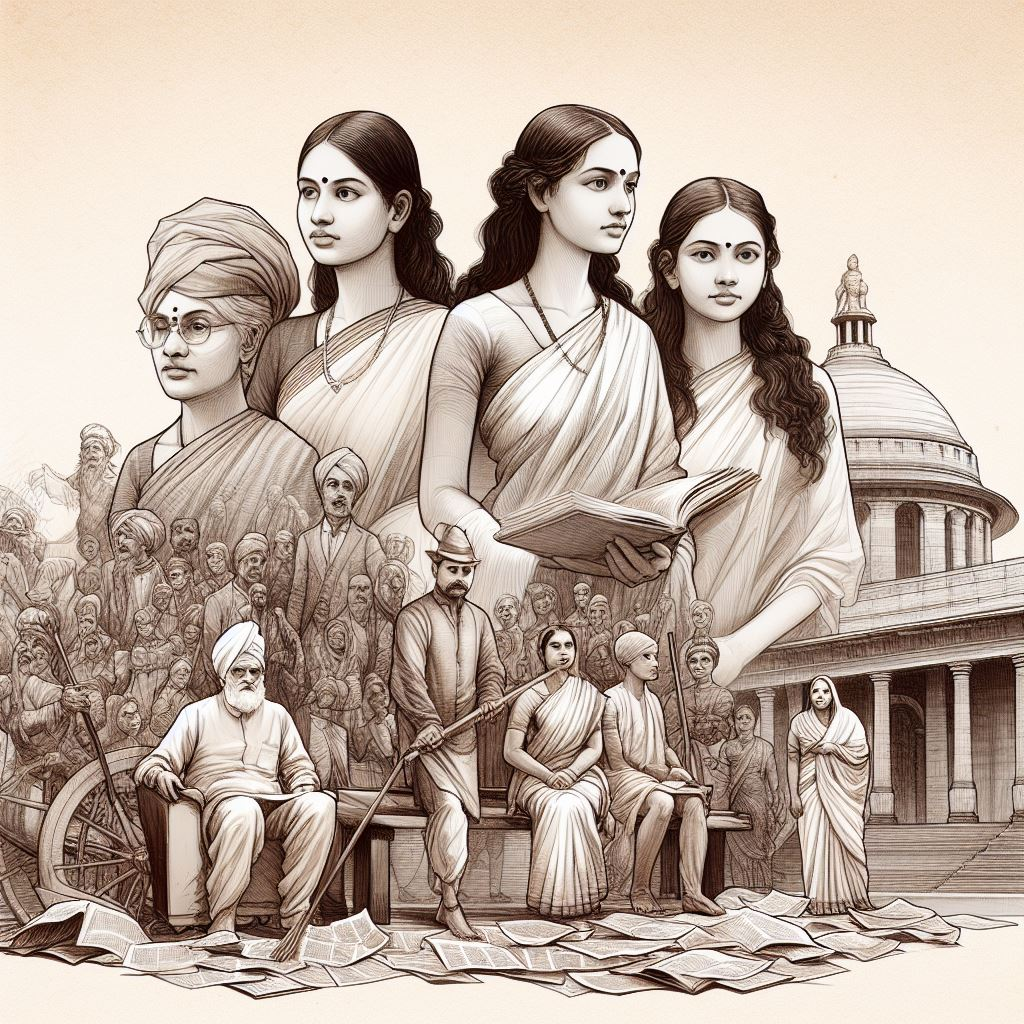The Preamble to the Constitution of India
The concept of Preamble was borrowed from American Constitution in the Indian constitution as the USA was the first state to incorporate Preamble in its constitution.
The term ‘Preamble’ generally refers to the introduction or preface to the Constitution.
The Preamble of the Indian Constitution is based on the ‘Objectives Resolution’, drafted and moved by Jawaharlal Nehru, and adopted by the Constituent Assembly. The preamble has been amended only once by the 42nd Constitutional Amendment Act (1976), which added three new words in it – Socialist, Secular and Integrity.
The Preamble in its present form:
“We, THE PEOPLE OF INDIA, having solemnly resolved to constitute India into a SOVEREIGN SOCIALIST SECULAR DEMOCRATIC REPUBLIC and to secure to all its citizens:
JUSTICE, Social, Economic and Political;
LIBERTY of thought, expression, belief, faith and worship;
EQUALITY of status and of opportunity; and to promote among them all;
FRATERNITY assuring the dignity of the individual and the unity and integrity of the Nation;
IN OUR CONSTITUENT ASSEMBLY this twenty-sixth day of November, 1949, do HEREBY ADOPT, ENACT AND GIVE TO OURSELVES THIS CONSTITUTION”.

Features of the Preamble
1. The Preamble states that the Constitution derives its authority from the people. In other words, the people of India are the ‘Source of Authority’ of the Constitution.
2. It describes the nature (or type) of India as a state: It asserts that India is a sovereign, socialist, secular democratic and republican state.
3. Preamble sets the objectives of the Constitution i.e., justice, liberty, equality and fraternity.
4. Finally it mentions the date of adoption of the Constitution i.e., November 26, 1949.
Key Terms in The Preamble
We will briefly discuss the keywords used in the preamble – Sovereign, Socialist, Secular, Democratic, Republic, Justice, Liberty, Equality and Fraternity.
Sovereign
India is an independent state and not a dependency or dominion of any other nation. it is free to conduct its own affairs (both internal and external).
Socialists
As a socialist state, India should aim to end poverty, ignorance, disease and inequality of opportunity. There are many forms of socialism, the Indian brand of socialism is considered as Democratic Socialism or a blend of Marxism and Gandhism. It was inserted in Preamble by the 42nd amendment of the constitution in 1976.
Secular
India is a secular state, which means that all religions in this country have the same status and support from the state.
Democratic
India has adopted representative parliamentary democracy. There exists a universal adult franchise, periodic elections, rule of law, independence of the judiciary, absence of discrimination on certain grounds and so on. The term Democratic in the Preamble refers to not only political democracy but also social and economic democracy.
Republic
It indicates that India has an elected head called the president. He is elected indirectly by the electorate college for a fixed period of five years.
Justice
The preamble mentions that Justice will be secured through various provisions of the constitutions like Fundamental Rights and Directive Principles. Further, justice should be prevailed in all spheres i.e., social, economic and political.
Liberty
Liberty means the absence of restraints on the activities of individuals. The Preamble secures to all citizens of India liberty of thought, expression, belief, faith and worship, through their Fundamental Rights. However, liberty does not mean ‘license’ to do what one likes and has to be enjoyed within the limitations mentioned in the Constitution itself.
Equality
The term ‘equality’ means treating all individuals on the same ground without any discrimination. The Preamble secures to all citizens of India equality of status and opportunity.
Fraternity
Fraternity simply means brotherhood (or a sense of brotherhood). The aim of the constitution is to promote fraternity by maintaining the dignity of the individual and the unity and integrity of the nation.
Significance of The Preamble
The Preamble represents the basic philosophy and fundamental values on which the constitution is based. It reflects the dreams and aspirations of its makers. It is considered a precious part of the constitution. Not Law can be made which violates the ideals enshrined in the preamble
Pandit T. D. Bhargava, a member of the Constituent Assembly, discussed the importance of the Preamble in the following words: “The Preamble is the most precious part of the Constitution. It is the soul of the Constitution. It is a key to the Constitution. It is a jewel set in the Constitution. It is a proper yardstick with which one can measure the worth of the Constitution“. Ernest Barker, a political scientist described the Preamble as the ‘key-note’ to the Constitution.
Explore More on Articles
References:
- Indian Polity – Laxmikanth
- Government of India

